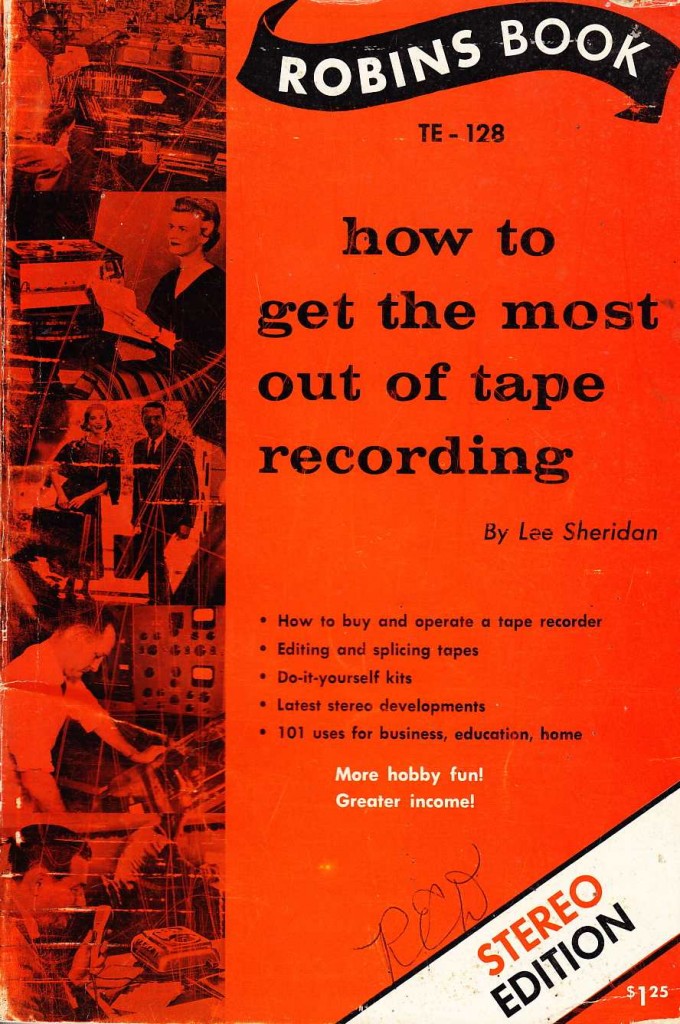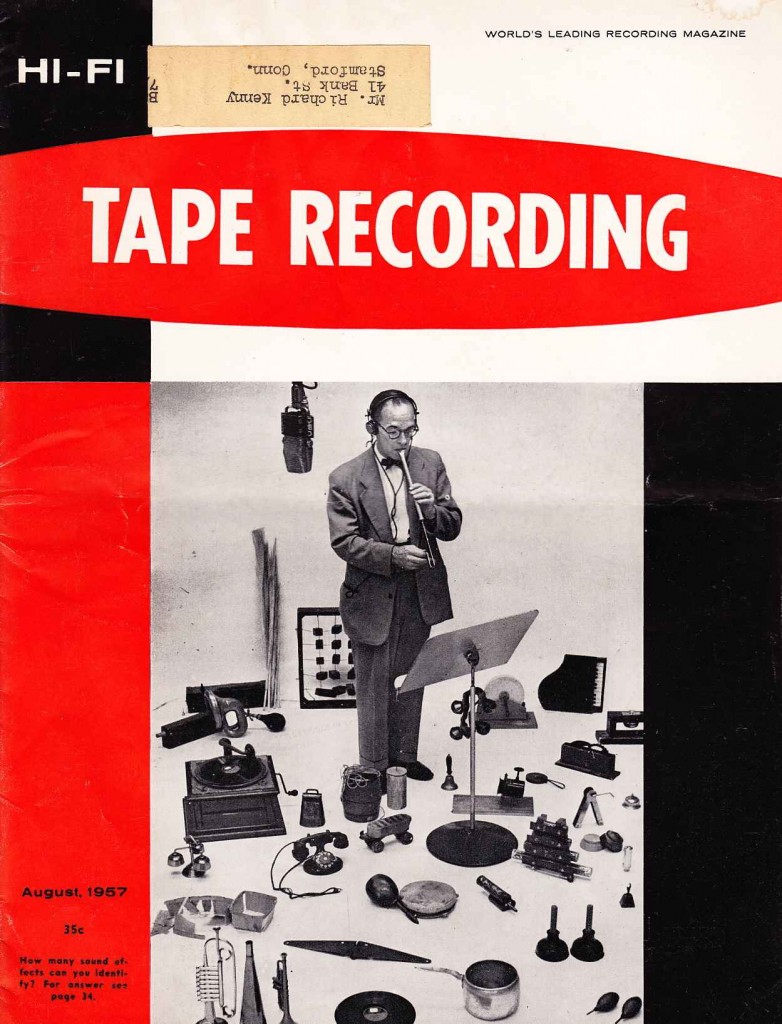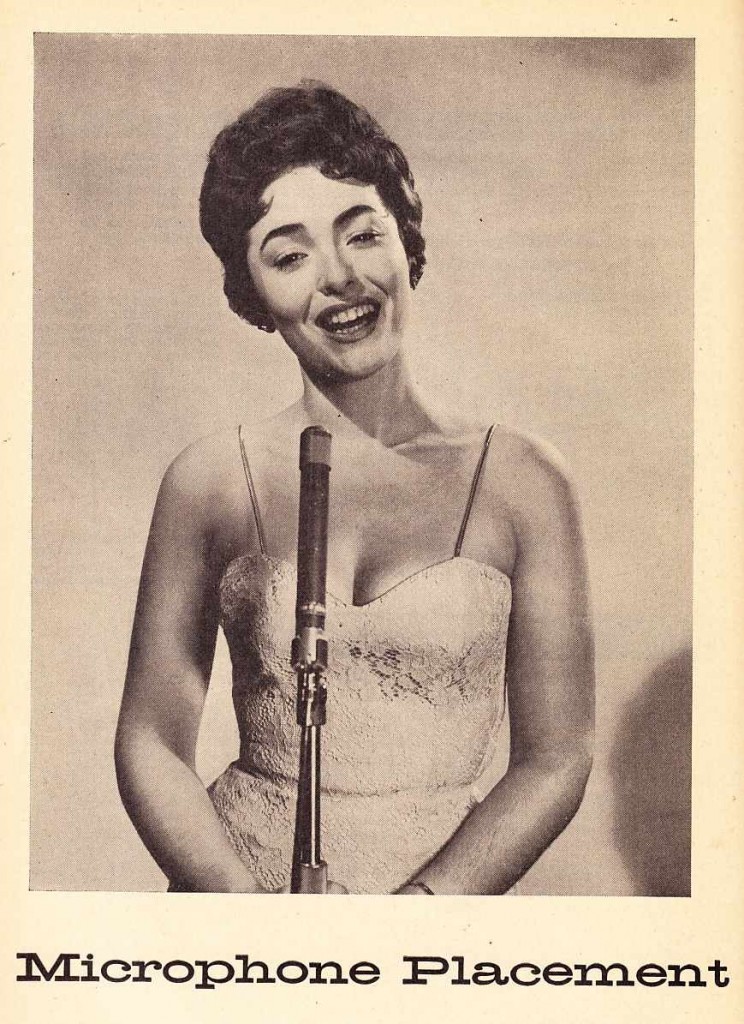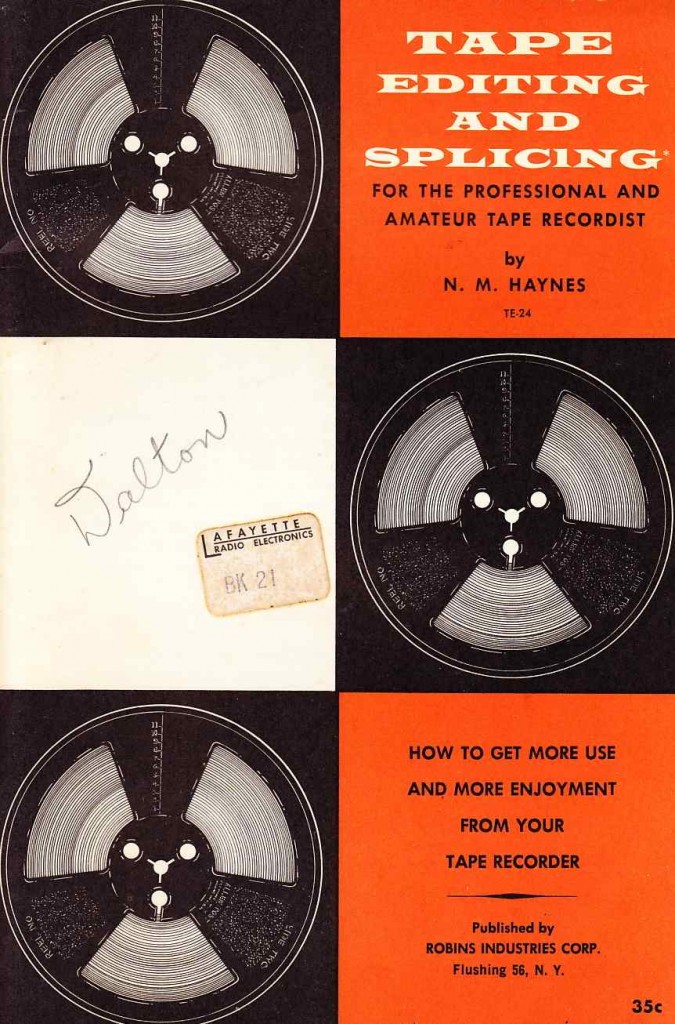 It is 1955. WWII-era German military-communications equipment has been successfully deconstructed, economized, and introduced to the American public as the Tape Recorder (via Bing Crosby, incredibly). Economies of scale allow these devices to be sold in vast number at widely accessible cost. For the average person, this is a significant new technology. And with new technology comes questions. How do I make this new stuff work? What can you do with this new stuff? Enter the handy Tape-Recording Guide Book, a once-genre unto itself.
It is 1955. WWII-era German military-communications equipment has been successfully deconstructed, economized, and introduced to the American public as the Tape Recorder (via Bing Crosby, incredibly). Economies of scale allow these devices to be sold in vast number at widely accessible cost. For the average person, this is a significant new technology. And with new technology comes questions. How do I make this new stuff work? What can you do with this new stuff? Enter the handy Tape-Recording Guide Book, a once-genre unto itself.
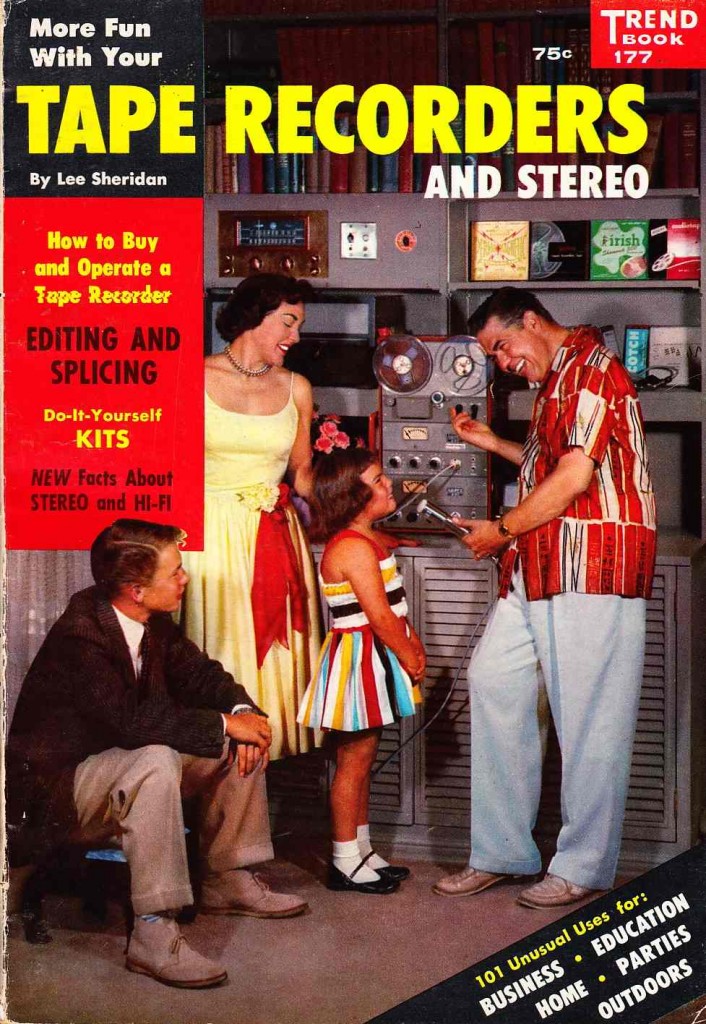 8mm film cameras had been widely available and fairly inexpensive for a few years already; as had bulky, low-fidelity wire-recorders and disc (shellac record) recorders. The tape recorder offered a few new advantages, though. Small size and relative ease-of-use; decent fidelity (sound quality); the ability to edit and to re-use bits of tape; and long recording-time at low cost. It was now possible to ‘capture the moment,’ to ‘capture everyday life,’ in a way never before possible.
8mm film cameras had been widely available and fairly inexpensive for a few years already; as had bulky, low-fidelity wire-recorders and disc (shellac record) recorders. The tape recorder offered a few new advantages, though. Small size and relative ease-of-use; decent fidelity (sound quality); the ability to edit and to re-use bits of tape; and long recording-time at low cost. It was now possible to ‘capture the moment,’ to ‘capture everyday life,’ in a way never before possible.
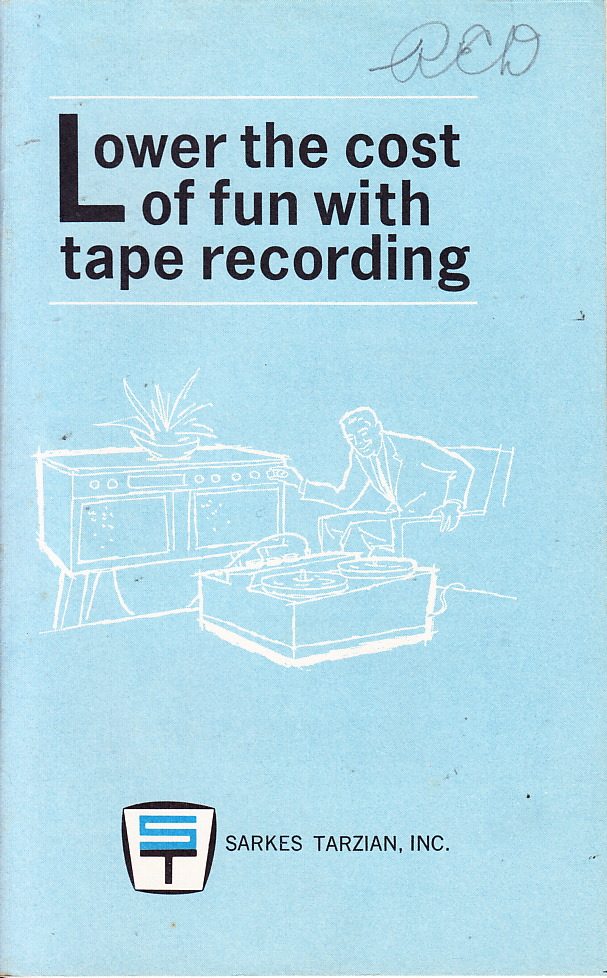 This deluge of information was not limited to the book-format; indeed, there were in fact regular periodicals solely devoted to the support of this new technology.
This deluge of information was not limited to the book-format; indeed, there were in fact regular periodicals solely devoted to the support of this new technology.
So much to learn. What we take as basic-assumptions regarding the operation of audio-equipment all had to be explained to us at some point. We now learn basic concepts such as ‘what to do with a microphone’ in a very informal, natural manner; early on, though, this was information best communicated /By Experts/ to /The Public/.
Beyond technical details like and ‘where to stick the mic’ and ‘editing the tape,’ there was also instruction regarding what kinds of sonic-event to capture. In these books, experts tell us not only ‘How-To-Use,’ but ‘When/Why-To-Use.’ In the image below, a tape-stock manufacturer of the era (Sarkes Tarzian, INC) delineates several fields of tape-recorder application that you may/may not have been aware of.
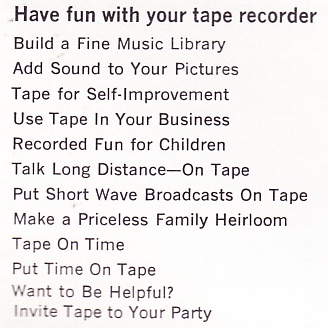 It is this last suggestion of ‘inviting tape to the party’ that I find most disturbing. Surprisingly, this ‘party-recording’ application gets a great deal of attention in most of the books scanned above. Please keep in mind that it is TAPE STOCK COMPANY that is suggesting that you ‘invite tape to your party.’ What possible benefit could it serve a TAPE STOCK COMPANY that you roll through seven $3.99 reels of tape in one evening? What possible benefit could it serve a TAPE STOCK COMPANY to reinforce this concept in the culture?
It is this last suggestion of ‘inviting tape to the party’ that I find most disturbing. Surprisingly, this ‘party-recording’ application gets a great deal of attention in most of the books scanned above. Please keep in mind that it is TAPE STOCK COMPANY that is suggesting that you ‘invite tape to your party.’ What possible benefit could it serve a TAPE STOCK COMPANY that you roll through seven $3.99 reels of tape in one evening? What possible benefit could it serve a TAPE STOCK COMPANY to reinforce this concept in the culture?
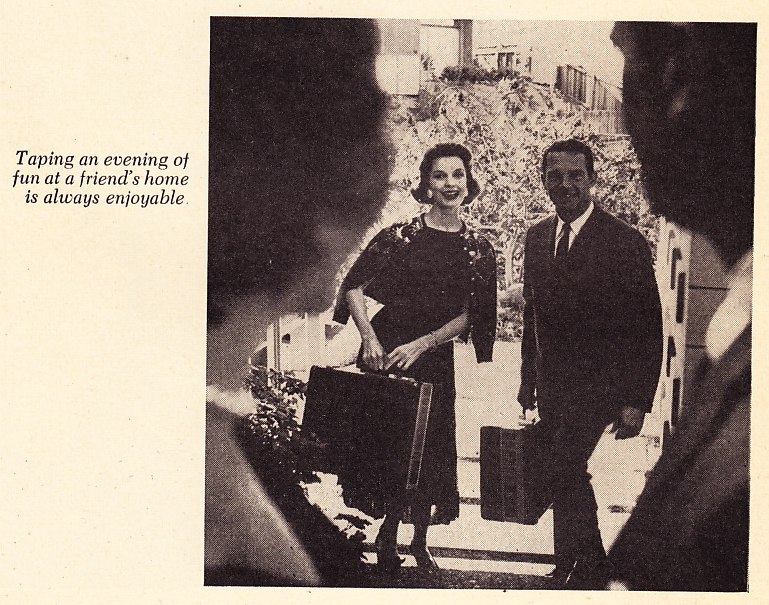 Oh really, you shouldn’t have. No, seriously. You shouldn’t have. Notice the strained look on her face. Is this due to the massive weight of a vacuum-tube powered reel-to-reel recorder, which she struggles to carry while wearing party-heels, or due to the fact that her husband has once again made them the pariahs of the scene by bringing along the dreaded time-binder, the magnetic-mind that forgets nothing, the One Who Recalls Things Best Forgotten, the tape-recorder.
Oh really, you shouldn’t have. No, seriously. You shouldn’t have. Notice the strained look on her face. Is this due to the massive weight of a vacuum-tube powered reel-to-reel recorder, which she struggles to carry while wearing party-heels, or due to the fact that her husband has once again made them the pariahs of the scene by bringing along the dreaded time-binder, the magnetic-mind that forgets nothing, the One Who Recalls Things Best Forgotten, the tape-recorder.
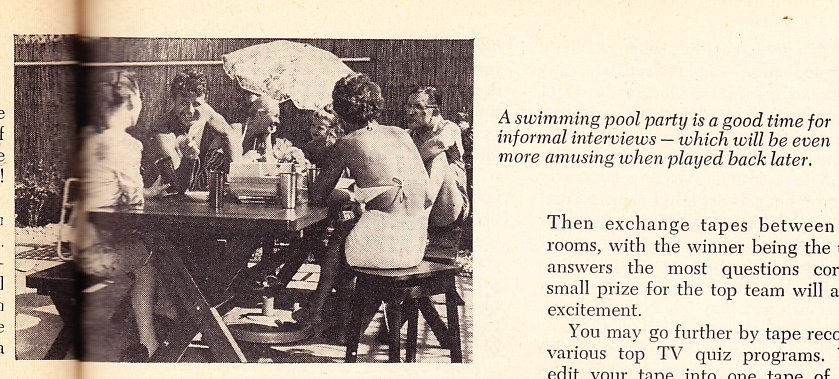 The mirror is fairly ancient technology. In fact, all it takes is for a baby to see her face in a reflective surface and there is some knowledge of the Appearance Of The Self. On the other hand, the sound-mirror (aka Tape Recorder) is a much newer concept. For every person who dislikes seeing photos of themselves, I can bring you 100 people who don’t like hearing the sound of their own voice recorded.
The mirror is fairly ancient technology. In fact, all it takes is for a baby to see her face in a reflective surface and there is some knowledge of the Appearance Of The Self. On the other hand, the sound-mirror (aka Tape Recorder) is a much newer concept. For every person who dislikes seeing photos of themselves, I can bring you 100 people who don’t like hearing the sound of their own voice recorded.
We are inundated with recording technologies today. Almost every cell phone has a video/audio recorder with performance that rivals the 8mm film cam/tape recorder technology that consumers first had access to in the 1950s. But before you capture the moment, perhaps it is best to ask yourself: why am I doing this? What benefit does it serve?
In the film LOST HIGHWAY, Bill Pullman’s character makes a remark that has always stuck with me. The remark can be heard in the trailer (see below), but here it is in text as well:
Ed: Do you own a video camera?
Renee Madison: No. Fred hates them.
Fred Madison: I like to remember things my own way.
Ed: What do you mean by that?
Fred Madison: How I remembered them. Not necessarily the way they happened.
Why do we remember?
What does the process of remembering do to our past experiences? How does it shape our future actions?
What is lost by subjugating memory to recording?
What kind of world are we building (via unheralded levels of self imposed ((Facebook)) and Government-Imposed ((Terrorists-already-having-won)) surveillance)?
